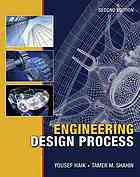
Engineering design process PDF
Preview Engineering design process
Engineering Design Process Second Edition This page intentionally left blank Engineering Design Process Second Edition Yousef Haik University of North Carolina—Greensboro Tamer Shahin Kings College London, UK Australia • Brazil • Japan • Korea • Mexico • Singapore • Spain • United Kingdom • United States Engineering Design Process, © 2011,2003Cengage Learning Second Edition ALL RIGHTS RESERVED. No part of this work covered by the Yousef Haik and Tamer Shahin copyright herein may be reproduced, transmitted, stored, Publisher, Global Engineering: or used in any form or by any means graphic, electronic, or Christopher M. Shortt mechanical, including but not limited to photocopying, recording, scanning, digitizing, taping, web distribution, Senior Acquisitions Editor: Randall Adams information networks, or information storage and retrieval Senior Developmental Editor: Hilda Gowans systems, except as permitted under Section 107or 108of the Editorial Assistant: Tanya Altieri 1976United States Copyright Act, without the prior written Team Assistant: Carly Rizzo permission of the publisher. Marketing Manager: Lauren Betsos For product information and technology assistance, Media Editor: Chris Valentine contact us at Cengage Learning Customer & Content Project Manager: Kelly Hillerich Sales Support, 1-800-354-9706 Production Service: RPK Editorial Services, Inc. For permission to use material from this text or product, submit all requests online at cengage.com/permissions. Copyeditor: Shelly Gerger-Knechtl Further permissions questions can be emailed to Proofreader: Martha McMaster [email protected] Indexer: Shelly Gerger-Knechtl Compositor: Integra Library of Congress Control Number: 2010922617 Senior Art Director: Michelle Kunkler ISBN-13:978-0-495-66814-5 Internal Designer: Carmela Pereira ISBN-10:0-495-66814-1 Cover Designer: Andrew Adams Cengage Learning Cover Images: © YAKOBCHUK VASYL/ 200First Stamford Place, Suite 400 Shutterstock; © ArchMan/Shutterstock; Stamford, CT 06902 © 3DProfi/Shutterstock USA Text and Image Permissions Researcher: Cengage Learning is a leading provider of customized Kristiina Paul learning solutions with office locations around the globe, Senior Rights Acquisitions Specialist: including Singapore, the United Kingdom, Australia, Mexico, Deanna Ettinger Brazil, and Japan. Locate your local office at: international.cengage.com/region. First Print Buyer: Arethea Thomas Cengage Learning products are represented in Canada by Nelson Education Ltd. For your course and learning solutions, visit www.cengage.com/engineering. Purchase any of our products at your local college store or at our preferred online store www.CengageBrain.com. Printed in the United States of America 1 2 3 4 5 6 7 13 12 11 10 To our parents, wives, and children. To future designers. This page intentionally left blank Brief Table of Contents Chapter1 Introduction 2 Lab 1: Ethics 27 Lab 2: Ethics and Moral Frameworks 33 Chapter2 Essential Transferrable Skills 42 Lab 3: Ice Breaking—Forming Teams 45 Lab 4: Team Dynamics 54 Lab 5: Project Management (Microsoft Project) 61 Lab 6: Presentation Style 90 Chapter3 Identifying Needs and Gathering Information (Market Research) 98 Chapter4 Customer Requirements 114 Lab 7: Kano Model Customer Needs Assessment 126 Chapter5 Establishing Functional Structure 132 Lab 8: Reverse Engineering 148 Chapter6 Specifications 152 Chapter7 Developing Concepts 172 Chapter8 Concepts Evaluation 190 Chapter9 Embodiment Design 212 Lab 9: Ergonomics 222 Chapter10 Detailed Design 230 Lab 10: Material Selection Tutorial 239 Lab 11: Geometric Dimensioning and Tolerancing 243 Lab 12: Use of Pro/MECHANICA®for Structural Analysis 243 Chapter11 Selection of Design Projects 270 vii This page intentionally left blank Contents Preface xv Chapter1 Introduction 2 1.1 Objectives 3 1.2 Definition of Engineering Design 3 1.2.1 Design Levels 3 1.3 Importance and Challenges of Engineering Design 4 1.4 Introduction to Systematic Design 6 1.5 Design Process 8 1.5.1 Identifying Customer Needs (Requirements) 12 1.5.2 Market Analysis (Requirements) 14 1.5.3 Defining Goals (Requirements) 15 1.5.4 Establishing Functions (Product Concept) 16 1.5.5 Task Specifications (Product Concept) 18 1.5.6 Conceptualization (Solution Concept) 19 1.5.7 Evaluating Alternatives (Solution Concept) 20 1.5.8 Embodiment Design 20 1.5.9 Analysis and Optimization 20 1.5.10 Experiment 21 1.5.11 Marketing 21 1.6 Professionalism and Ethics 22 1.6.1 NSPE Code of Ethics 22 LAB 1: Ethics 27 LAB 2: Ethics and Moral Frameworks 33 1.7 Problems 38 1.7.1 Team Activities 38 1.7.2 Individual Activities 38 1.8 Selected Bibliography 40 Chapter2 Essential Transferable Skills 42 2.1 Objectives 43 2.2 Working In Teams 43 2.2.1 Forming a Team 44 LAB 3: Ice Breaking—Forming Teams 45 2.2.2 Dynamics of a Team 51 LAB 4: Team Dynamics 54 2.3 Scheduling 55 2.3.1 Gantt Chart 56 2.3.2 CPM/PERT 57 ix
